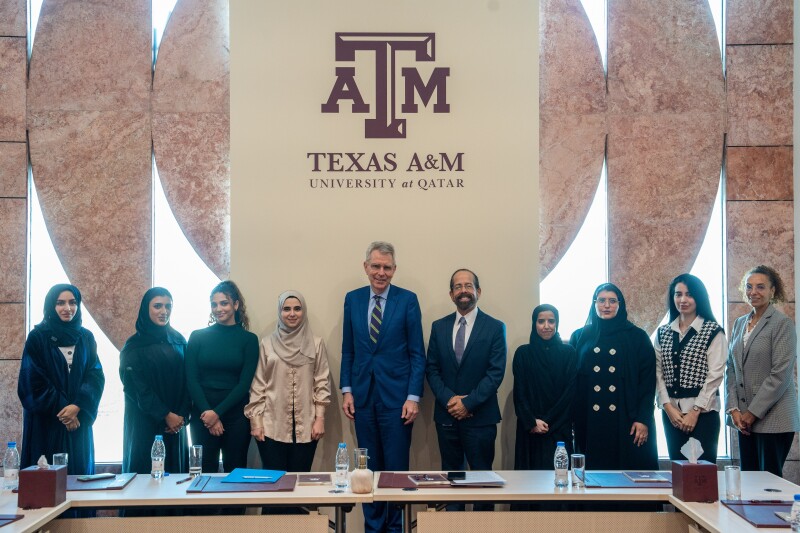Current and former female engineering students recently gathered at Texas A&M University at Qatar (TAMUQ) to discuss the challenges and solutions for women working in the energy sector as part of the university’s “Women in Energy” roundtable. Students were joined by César Octavio Malavé, dean of TAMUQ, Ambassador Geoffrey Pyatt, US Assistant Secretary of State for Energy Resources, and Natalie Baker, Deputy Chief of Mission for the US Embassy in Qatar.
The roundtable also included discussions about the increase in the number of women engineers, the need for continuing education, and overall changes in the industry over the past decade. TAMUQ’s fall 2022 undergraduate population was 48% female, compared to 71% female graduate students. “Nearly 50% of our engineering students are female. That’s double the national average of women in engineering in the US,” Malavé shared in a press release. While the increase in female engineering students is on the rise, gender-based issues continue to affect students.
Tabarak Abdulhussein Al-Lami, a 2018 graduate of TAMUQ with a degree in petroleum engineering who now works as a reservoir engineer, reported one of the biggest issues she has faced in the industry. “There are multiple challenges; however what comes vividly to my mind right now is the fact that some of the onsite engineering facilities are simply not built to accommodate women. As a result, many female engineers end up being stripped away from many site opportunities which can heavily affect their professional growth and enrichment.” Current student, Al-Anoud Al-Emadi, an electrical and computer engineering student, echoed Al-Lami’s concerns. “I cannot argue against the fact that there are significant barriers for women working in the energy sector today. I can recall searching for a sponsor who would accept women in my field of study during my first year of college. It was difficult, and one employer turned me down because of my gender. If I wanted to get the university's sponsorship, I was requested to change my major, and I don't think the company's reaction was fair,” she shared.
Other issues raised during the roundtable include the unconscious biases against female engineers, maternity leave, and how a possibility of flexible work will allow more women to succeed. TAMUQ has made significant strides over the past decade to combat these issues, including:
- Female-orientated events organized by the university, including a women’s networking event, outreach sessions at local girls’ schools which feature female faculty and successful female alumni to talk about the importance and benefits of pursuing an education in engineering. Recently, they organized a panel discussion to highlight the importance of female STEM graduates for Qatar’s workforce.
- The Women’s Faculty Forum (WFF) at TAMUQ was created to advocate and represent the needs of female faculty at the university through raising awareness of gender equality issues. WFF’s mission is to build a community to support the TAMUQ female faculty, academic staff, and students to achieve their full potential and equitable representation in leadership positions and roles through initiatives that emphasize recruitment, retention, and advancement.
- The creation of the Women’s Mentorship Program, a peer mentoring program matches female freshmen with female upperclassmen and provides them with guidance and support to help them understand the expectations of university life and the transition from high school.
- Ghada Salama was appointed in 2022 as Dean’s Fellow for Diversity for the period 2022–2024. In this position, she will coordinate new programs designed to recruit and retain female PhD students and faculty as part of a broader effort to strengthen the presence of female engineers on the campus.
- In the summer of 2022, the university launched a US-Pakistan Women’s Council Future of Women in Energy Scholars program. The program was sponsored by the US-Pakistan Women’s Council, a public-private partnership between the US Department of State and Texas A&M University, that seeks to increase women’s economic participation in Pakistan by promoting women’s entrepreneurship, employment, and access to educational opportunities.
- Many alumni hold leadership positions in the Qatar Women Engineers Association and frequently collaborate with the university.
These programs have undoubtedly assisted female engineering students, along with the curriculum offered by the university. “Technical skill-wise and soft skills, TAMUQ prepared me very well. When I joined the industry, I was skilled in all disciplines, petroleum/reservoir engineering, petrophysics and geology. At other universities they would only focus on petroleum engineering, and so it was difficult for those to understand the intersectional project at the beginning,” 2011 petroleum engineering graduate, Abeer Buhelaiqa, who now works as a reserves reservoir engineer, shared. Al-Emadi also shared her thoughts on what TAMUQ and other universities can do to help women in the industry succeed. “The best way, in my opinion, for Texas A&M and other universities to address gender inequality and appreciate women in the energy sector is to interact with women in the same way as they interact with men. This could be accomplished by not excluding women from the hands-on activities because of their gender. To obtain experiences in a certain study, it must be equally shared, and women must take part in this opportunity.”
During the roundtable, Ambassador Pyatt applauded the university for its work towards developing female engineers and said, “Education is one of the most powerful tools we have to empower women. It is a time of massive transformations in the energy sector worldwide, and it is more important than ever to ensure that we have people from diverse backgrounds in this ecosystem. We have to continue to champion women’s voices in STEM.”
When asked where she would like to see the industry in 10 years, Al-Emadi said, “In 10 years, I hope that society's attitudes regarding women working in the energy sector will have improved.” A sentiment which was shared by Al-Lami, “Creating an inclusive environment for women where they have a seat at the table, an opinion to make and a voice to be heard.”


